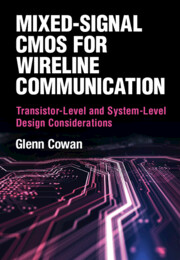 Mixed-Signal CMOS for Wireline Communication
Mixed-Signal CMOS for Wireline Communication Published online by Cambridge University Press: 05 December 2024
Every designer of integrated circuits for optical transceivers needs to be familiar with the fundamentals of optical channels and the devices that convert electrical signals to optical signals and vice versa. This chapter provides a concise overview starting with optical fibre. Single-mode and multi-mode fibre are described as well as the characteristics of on-chip optical channels. Optical-to-electrical conversion through photodiodes is discussed along with simple electrical models. Considerations for implementing photodiodes entirely in silicon are included in a separate section. On the transmitter side, both direct modulation and indirect modulation are presented. This chapter summarizes the physics of laser diodes and gives a simplified model of the electrical dynamics and their electrical to optical conversion. Similarly, an electrical model and a model for E/O conversion will be presented for Mach–Zehnder interferometer-based modulators. The chapter closes with an overview of silicon photonics.
To save this book to your Kindle, first ensure no-reply@cambridge.org is added to your Approved Personal Document E-mail List under your Personal Document Settings on the Manage Your Content and Devices page of your Amazon account. Then enter the ‘name’ part of your Kindle email address below. Find out more about saving to your Kindle.
Note you can select to save to either the @free.kindle.com or @kindle.com variations. ‘@free.kindle.com’ emails are free but can only be saved to your device when it is connected to wi-fi. ‘@kindle.com’ emails can be delivered even when you are not connected to wi-fi, but note that service fees apply.
Find out more about the Kindle Personal Document Service.
To save content items to your account, please confirm that you agree to abide by our usage policies. If this is the first time you use this feature, you will be asked to authorise Cambridge Core to connect with your account. Find out more about saving content to Dropbox.
To save content items to your account, please confirm that you agree to abide by our usage policies. If this is the first time you use this feature, you will be asked to authorise Cambridge Core to connect with your account. Find out more about saving content to Google Drive.